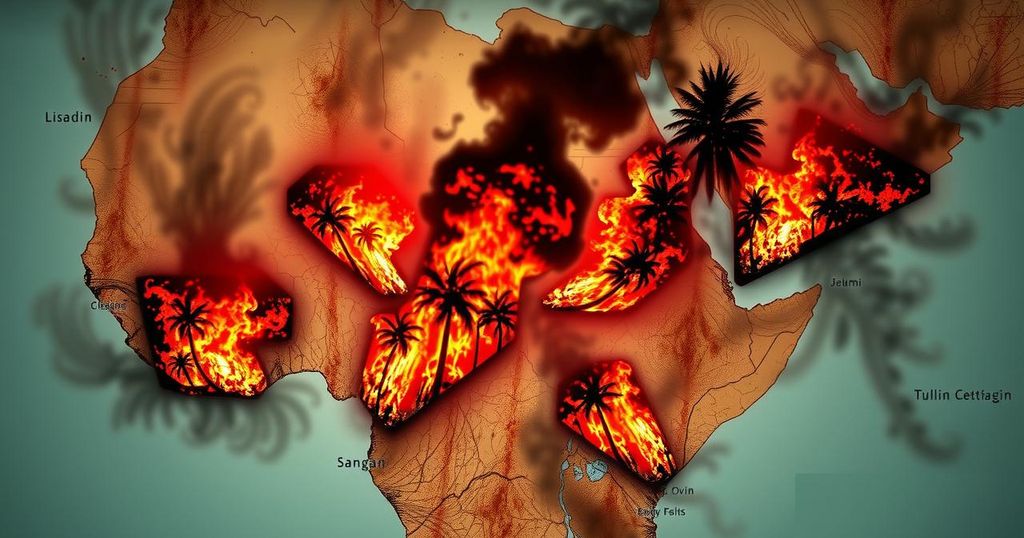Central African nations are facing multidimensional crises marked by climate shocks, humanitarian challenges, and political instability. Over three million people have been displaced in 2023. The region’s worsening situation necessitates greater international support, particularly for climate resilience and humanitarian assistance, as emphasized by UN officials. Upcoming elections and regional security measures are also focal points requiring attention.
Central African nations are currently facing severe challenges, including security threats, extreme weather events, and growing political divisions, as highlighted by Abdou Abarry, the UN Special Representative for Central Africa. In an address to the Security Council, Mr. Abarry reported that over three million individuals in the region have been displaced this year due to climate-related disasters, exacerbating existing socio-economic vulnerabilities and highlighting the urgent need for enhanced climate action.
The Congo Basin forest, an essential global carbon sink recognized at COP29, is critically impacted by insufficient international climate financing, with less than 15% of pledged assistance being delivered. Humanitarian conditions have significantly declined, particularly exacerbated by population displacements and health crises, such as Mpox, primarily affecting the Democratic Republic of Congo. Mr. Abarry underscored the necessity for a more robust response from the international community to address these escalating requirements.
In terms of political developments, Mr. Abarry informed the Security Council about the recent legislative elections in Rwanda and ongoing preparations for upcoming elections in several Central African nations, including Burundi, Cameroon, Gabon, and the Central African Republic, all scheduled for next year. Countries such as Chad and Gabon have requested electoral support from the United Nations, illustrating their confidence in the organization.
Mr. Abarry stressed the importance of ongoing efforts to mitigate insurgencies in the Lake Chad Basin, specifically regarding Boko Haram affiliates. He also acknowledged the peaceful resolution of disputes among countries in the region, with Gabon and Equatorial Guinea referring their border dispute to the International Court of Justice and encouraging high-level discussions between Chad and CAR concerning border security.
Looking forward, Mr. Abarry delineated key priorities for the region, emphasizing the need for increased international funding for climate resilience, humanitarian efforts, and peace-building initiatives. The United Nations Regional Office for Central Africa (UNOCA) plans to facilitate these endeavors and promote regional stability. A significant summit organized by the Economic Community of Central African States (ECCAS) in collaboration with UNOCA is scheduled for February 2025, focusing on addressing climate and humanitarian issues.
In concluding his remarks, Mr. Abarry expressed optimism for a future characterized by peace, justice, and prosperity by 2025, underpinned by a revitalized commitment to multilateralism aligned with the UN Charter and the ideals of a Pact for the Future.
Central Africa is currently beset by a myriad of crises, encompassing security threats from insurgent groups, severe climate shocks resulting in widespread displacement, and growing political challenges amid upcoming elections. A significant concern is the vulnerability of the Congo Basin forest, which plays a vital role in global climate regulation. International responses to these crises, particularly in the form of climate financing and humanitarian aid, have been inadequate, thus compounding the region’s socio-economic instability.
In summary, Central Africa is confronting extensive challenges, including climate-related crises, humanitarian emergencies, and complex political landscapes. The need for concerted international action is urgent to address the staggering needs of displaced populations and improve humanitarian conditions. Regional stability and peace are contingent upon enhanced funding for climate resilience and humanitarian efforts, alongside the integrity of electoral processes. The anticipated summit in 2025 presents a crucial opportunity for collaborative solutions to these pressing issues.
Original Source: news.un.org






